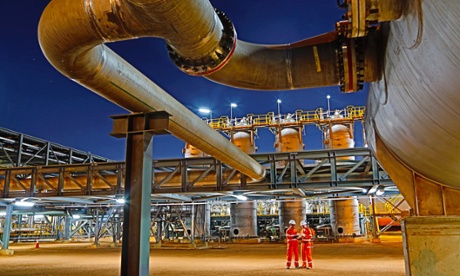Mining tax: it's time for all Australians to realise they are being ripped off
The
mining boom has resulted in a huge extraction of wealth. Norway has
been turning its resource bounty into a fund for future generations,
while Australia is dangerously careless with it
mining boom has resulted in a huge extraction of wealth. Norway has
been turning its resource bounty into a fund for future generations,
while Australia is dangerously careless with it

Australians are routinely being told that hefty mining taxes would hinder the
country’s largest exports of coal and iron ore. This concern about the competitiveness of the industry has been the
basis of the Abbott
government’s drive to abolish the mining tax. However, it is hard to reconcile this view (key player Gina Rinehart, for example, claimed that Australia was “too expensive to do export orientated business”) with news this week that mining giant BHP
Billiton recently increased its profits by 83% to US$8.1bn.
Within the last year alone, there has been a 20% increase in BHP Billiton’s
Western Australian iron ore exports. In spite of this enormous growth,
the company only paid US$29m in minerals resource rent tax (MRRT).
As it stands, the tax is in no way making BHP uncompetitive – its bumper
profits are a testament to that.
While mining companies such as BHP Billiton
are making a motza, we need to be reminded that 83%
of Australian mining operations are foreign owned. The net income
balance – the difference between the profits of Australian investing
overseas, and profits made by foreign companies in Australia – has
suffered as a result of mining companies extracting greater amounts of
Australian mineral wealth for foreign owners.
From 2003 to 2011, the net income balance
reduced from minus
2% to - 6% of Australian GDP. In other words, Australia is being held at gun point by day light robbers.
Unlike Australia, Norway has kept their resource extraction wealth in their
control without it fattening up a capitalist exploiting of finite
mineral resources. Norway has a 78% tax on
oil and gas revenues – unlike Australia, where the effective tax rate
is a mere 13%. $60bn from gas sales to continental Europe is
annually deposited in the Norwegian sovereign wealth fund. The fund has 5.11
trillion Krone (AU$930bn), or twice Norway’s GDP.
Pal Haugerud,
director general of the asset management in the department of the Norwegian
ministry of finance, has explained Norway’s policy:
It is a fund forIf the Norwegian experience has
future generations, both current and future. And that’s a
responsibility for us to make sure that not only this generation, but also
future generations get their fair share of the wealth because it is a one off.
It is a transformation of wealth. We used to have wealth beyond the North Sea
and now we are transferring that into financial assets.
demonstrated anything it is that resources cannot move, unlike factory
operations which can move to a jurisdiction with the lowest
regulation, wage or taxation level. If taxed heavily, corporations have no
option but to pay a fair price for those resources. If a company threatens to
cease operation, government should offer to nationalise the operation at a fair
price, so a public company similar to Statoil can extract the profits
and deposit them in a sovereign wealth fund, reduce taxation or improve
infrastructure and social spending. Norway’s example demonstrates that, after
20 years, private companies will remain and continue to make a profit – with margins reduced.
But while Norway has been prudent with its
resource bounty of $185,000
for every citizen, Australia has not.
Fairfax economics editor Ross
Gittins notes that Australia’s structural deficit emerged in 2002, when the
Howard government slashed taxes and increased spending. This spending took the
form middle class welfare: the baby bonus, private education and health care
costs, superannuation concessions, etc (no wonder the IMF
identified the Howard government in this period as one the two profligate
government in the last 200 years of Australian history). What does Australia
have to show for the mining boom? A few extra flag poles
in schools and a $800bn infrastructure deficit – which the Coalition is now using as an
excuse to flog off everything from Australia
Post to Medibank
Private and even incentivise
the offloading of state government assets.
From 2012 to 2016, up to $50bn
of dividends of Australian wealth will leave Australia. What could that buy? If
we increased taxation rates to Norwegian levels, imagine what that would
purchase.
It
is not xenophobic to believe that Australians should receive the maximum
benefit from their property. Australia’s mineral wealth is owned by the Crown;
the Crown holds those resources in trust so they may benefit citizens. Those
resources ought to be exploited by the Australian citizenry because they belong
to them.
Resources are a special case for protection
because they are finite and owned by the collective. For the sale of any
property, one would expect to get a fair price for it. The Crown
holds those resources for the collective which a majority of Australians (54%)
presently expect to receive significantly more tax, according to a recent UMR
Research poll. Foreign multinational mining companies such as BHP Billiton
and Rio Tinto pay a mere 13%
tax on the profits (not the value) of our property; the middle man pockets the
difference.
Still think we’re getting a good deal? Imagine
the sale of another form of property. Say you want to sell your family home say
for a million dollars, the real estate agent takes a 87% commission and you
receive a mere $130,000 from the sale. Would you be fuming with rage, foaming
at the mouth, gnashing your teeth? That $870,000 is now in the pocket of
someone else, and you cannot get it back ever again; most of it will flow
overseas. That is the sort of loss of wealth Australia is experiencing.
The historian Philip
Mirowski has argued the past three decades have been about using the
powers of the state to divert more resources to the wealthy. In Australia’s
case, a lot of the wealthiest do not even call
Australia home. Meanwhile, all Australians are ripped off. It’s time to change that.

No comments:
Post a Comment